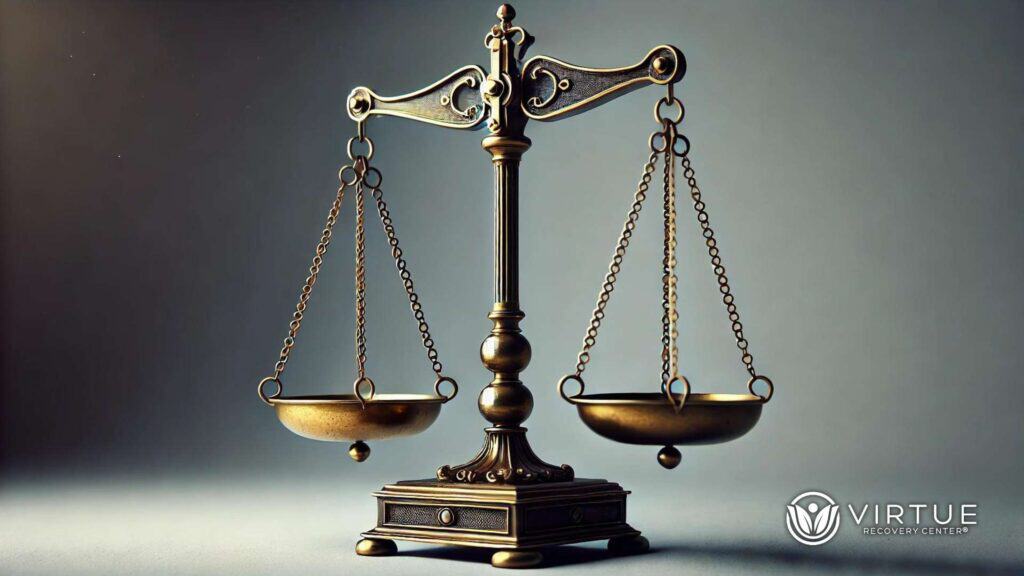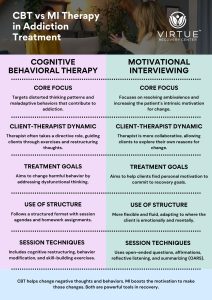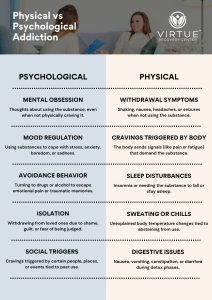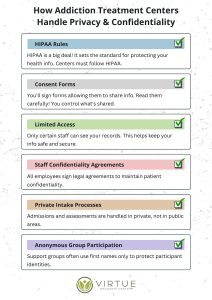Understanding the difference between substance abuse and addiction is crucial for identifying the right path to recovery. This article explores how substance use can escalate into substance use disorder (SUD), the physical and mental health impacts of drug and alcohol misuse, and the importance of recognizing the signs early. Substance abuse and addiction are serious health conditions that require professional treatment to overcome. If you or a loved one is struggling, contact Virtue Recovery Las Vegas at 866-520-2861 for support.
Key Takeaways
- Substance abuse involves the misuse of drugs or alcohol that leads to negative consequences, while addiction is a chronic disease characterized by compulsive substance use despite these consequences.
- Early recognition of substance misuse can prevent the development of substance use disorder and help individuals avoid the severe health impacts of addiction.
- Addiction treatment is essential, as addiction affects both the brain and behavior, making it difficult to stop using without professional help.
Introduction
In the United States, millions of people struggle with substance abuse and addiction, two terms that are often used interchangeably but have distinct meanings. Understanding the difference between these terms is critical for recognizing the signs of a problem and seeking the appropriate treatment. Substance abuse refers to the harmful or hazardous use of drugs or alcohol. At the same time, addiction is the most severe form of substance use disorder (SUD), characterized by a compulsive need to use the substance despite negative consequences. This article will explore the differences between substance abuse and addiction, their impact on health, and the importance of seeking help through comprehensive treatment programs.
Defining Substance Abuse and Addiction
What is Substance Abuse?
Substance abuse occurs when an individual uses drugs or alcohol in a way that is harmful to themselves or others. This misuse can include using a substance in larger quantities than prescribed, using someone else’s prescription medication, or using illegal drugs. People may abuse drugs or alcohol to cope with stress, avoid reality, or for recreational purposes. Still, this behavior often leads to negative consequences such as health problems, legal issues, and strained relationships. For example, alcohol use becomes substance abuse when it leads to binge drinking, impaired judgment, or alcohol poisoning.
What is Addiction?
Addiction is a chronic disease that develops from substance abuse and is considered the most severe form of substance use disorder. Addiction is characterized by the compulsive need to use the substance despite its harmful effects on the individual’s life. Addiction involves physical dependence on the substance, meaning that the body has adapted to the drug, and withdrawal symptoms occur if the person stops using it. Addiction also causes changes in the brain, particularly in areas related to judgment, decision-making, and behavior, making it extremely difficult to stop using without professional help.
The Progression from Substance Abuse to Addiction
How Substance Use Can Lead to Addiction
The progression from substance abuse to addiction often begins with the occasional use of a substance. Over time, as the brain becomes accustomed to the effects of the substance, the individual may begin to use it more frequently and in larger amounts. This increased use leads to changes in the brain’s reward system, particularly in releasing a chemical called dopamine, which reinforces the behavior. As a result, the individual may develop a tolerance, requiring more of the substance to achieve the same effect, which increases the risk of addiction.
Risk Factors for Developing Addiction
Certain factors increase the risk of developing addiction from substance abuse. These include genetic predisposition, exposure to substance use at an early age, and the presence of mental health conditions such as depression or anxiety. Individuals who misuse prescription medication, opioids, or nicotine are particularly vulnerable to developing addiction. Additionally, people with a history of substance abuse are more likely to become addicted if they continue using drugs or alcohol despite the negative consequences.
The Impact of Substance Abuse and Addiction on Health
Mental and Physical Health Consequences
Both substance abuse and addiction have severe consequences for an individual’s mental and physical health. Substance abuse can lead to a range of health issues, including liver disease, heart problems, and an increased risk of accidents. Addiction exacerbates these risks and often leads to mental health conditions such as depression, anxiety, and dual diagnosis, where an individual has both a substance use disorder and another mental health condition. Addiction can also cause significant brain damage, particularly in areas related to decision-making, memory, and behavior, leading to long-term cognitive impairment.
Withdrawal Symptoms and Physical Dependence From Alcohol and Drug Abuse
One of the most challenging aspects of addiction is dealing with withdrawal symptoms, which occur when an individual stops using the substance. Withdrawal symptoms can vary depending on the substance but often include nausea, sweating, tremors, anxiety, and in severe cases, seizures or hallucinations. These symptoms are a result of physical dependence on the substance, where the body has become so accustomed to the drug that it cannot function normally without it. The fear of experiencing these symptoms often drives individuals to continue using the substance despite knowing it’s harmful.
The Importance of Treatment for Addiction
Addiction is a Disease, but it’s Treatable
It’s important to understand that addiction is a disease that affects the brain, but it is also a treatable condition. Addiction treatment involves addressing both the physical dependence and the underlying psychological issues that contribute to the behavior. There are various types of treatment available for substance use disorders, including detoxification, behavioral therapy, and medication-assisted treatment. These programs aim to help individuals stop using the substance, manage withdrawal symptoms, and develop coping strategies to avoid relapse.
Seeking Help and Treatment Options for Alcohol and Drug Addiction
If you or someone you know is struggling with substance abuse or addiction, it’s crucial to seek help from a qualified healthcare provider or an addiction treatment center. Treatment options range from outpatient programs, where individuals receive therapy while continuing to live at home, to inpatient rehab, which provides a more intensive, structured environment. The choice of treatment depends on the severity of the SUD and the individual’s specific needs. Continuous support, such as counseling and participation in support groups, is essential for preventing relapse and ensuring long-term recovery.
Conclusion
Understanding the differences between substance abuse and addiction is vital for recognizing the signs early and seeking the appropriate treatment. Addiction is a chronic disease that requires professional intervention, but with the right support and treatment, recovery is possible. If you or a loved one is struggling with substance use or addiction, don’t hesitate to reach out for help. Contact Virtue Recovery Las Vegas at 866-520-2861 to explore your treatment options and start the journey to recovery.
FAQs
What is the difference between substance abuse and addiction?
Substance abuse involves the harmful or hazardous use of drugs or alcohol, leading to negative consequences. At the same time, addiction is the most severe form of substance use disorder characterized by compulsive use despite these consequences.
How can substance abuse lead to addiction?
Substance abuse can lead to addiction as continued misuse of a substance causes changes in the brain, particularly in the reward system, leading to a compulsive need to use the substance despite harmful consequences.
What are the health consequences of substance abuse and addiction?
Substance abuse and addiction can lead to severe physical and mental health issues, including liver disease, heart problems, mental health conditions, cognitive impairment, and withdrawal symptoms.
What are the symptoms of withdrawal, and how can they be managed?
Withdrawal symptoms vary by substance but often include nausea, anxiety, tremors, and seizures. Managing withdrawal typically requires medical supervision and can involve medication-assisted treatment.
What types of treatment are available for substance use disorders?
Treatment options for substance use disorders include outpatient programs, inpatient rehab, detoxification, behavioral therapy, and medication-assisted treatment. The choice of treatment depends on the severity of the disorder and the individual’s needs.
How does someone become addicted to a substance?
Addiction develops when repeated use of a substance changes the brain’s reward system, leading to compulsive drug-seeking behavior despite harmful consequences. Over time, tolerance builds, requiring more of the substance to achieve the same effect, further reinforcing the cycle of addiction.
What is the difference between drug & alcohol misuse and addiction?
Misuse refers to using a substance in a way that is harmful or not intended, such as drinking excessively or taking prescription drugs without a prescription. Addiction, however, is a chronic, relapsing disorder characterized by a physical and psychological dependence on the substance, resulting in compulsive use despite negative impacts on health and life.
What are some indications someone is likely to become addicted to a substance?
Indications include frequent use, increasing tolerance, withdrawal symptoms when not using, neglect of responsibilities, and continued use despite negative consequences. Behavioral changes, such as isolation, mood swings, and secrecy, can also signal a developing addiction.
When should I seek addiction treatment?
You should seek addiction treatment when substance use starts affecting your health, relationships, work, or daily life. If you find it difficult to stop using despite wanting to quit, or if you experience withdrawal symptoms, it’s a strong sign that professional help is needed.
Resources
https://www.apa.org/topics/substance-use-abuse-addiction
https://medlineplus.gov/druguseandaddiction.html
https://www.webmd.com/mental-health/addiction/substance-abuse
https://nida.nih.gov/publications/drugs-brains-behavior-science-addiction/drug-misuse-addiction













